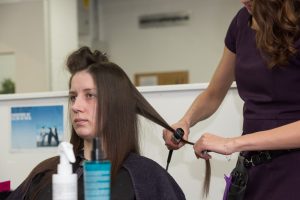 Women make up about 5% of England and Wales’ prison population. Do they have different needs or wants in terms of education? And are we catering to these needs enough? Head of Policy Francesca Cooney takes a look.
Women make up about 5% of England and Wales’ prison population. Do they have different needs or wants in terms of education? And are we catering to these needs enough? Head of Policy Francesca Cooney takes a look.
Many women entering prison have had a disrupted education – 31% have been expelled or permanently excluded from school. And 31% have experienced being taken into care as a child, which may have meant moving home and school and periods of absence from education, alongside emotional upheaval. It is unsurprising then, that many women entering prison have not passed exams at school – but the figure of 71% without any qualifications at all is staggering.
Completing education in prison can be a huge boost to self-confidence, particularly for people who might not have thought that educational achievements were possible for them.
When Ofsted inspects education provision in women’s prisons, it assesses whether the range of activities is sufficient to meet women’s needs and if provision is diverse and not based on gender stereotypes. In the past, Ofsted has sometimes been critical of the options available to women studying in prison, but this is changing.
Every year, PET funds over 200 women in prison to take distance learning courses, offering the same courses to both the male and female estate. Some of the women we’ve funded use what they learn to support others on a similar journey – from founding charities helping women after release, to supporting young people caught up in crime.
Completing education in prison can be a huge boost to self-confidence, particularly for people who might not have thought that educational achievements were possible for them. This self-belief can begin to open doors for women – further study, training or taking on a more responsible role in the prison.

Women practicing beauty techniques inside prison
Although hair and beauty training in women’s prisons may seem like a stereotypical approach to educating women, it fulfills a useful function. Trauma experienced through domestic or sexual abuse can impact on body image and self-image. Programmes that recognise this – assertiveness classes in education, health and fitness in the gym, and access to a beauty salon in the prison – can build self-esteem and confidence. Taking part in these activities in a safe and supportive environment can be empowering and help women develop the life skills necessary for successful resettlement.
If women learn a trade that means they can be financially independent, it could mean less chance of being in a relationship that is exploitative.
In some women’s prisons, the beauty salon provides a real working environment with professional standards and qualifications that women can use to set up a business, and this is potentially flexible around child care commitments. Additionally, if women learn a trade that means they can be financially independent, it could mean less chance of being in a relationship that is exploitative.
The Ministry of Justice’s Education and Employment strategy acknowledges that to support women who leave prison successfully, there needs to be a specific approach. Currently employment outcomes for women going back into the community are worse than for men. Fewer than one in ten women have a job to go to on release. Many women leaving prison will not be able to access jobs, training or education opportunities without affordable childcare support.
Partnering with universities can offer people in prison the chance to study at a higher level.
Ideally, women would have access to a range of activities that supported their diverse interests and achievement levels, and a broad variety of educational and vocational opportunities. But providing a sufficient range of activities is very challenging. Women’s prisons are usually smaller than male establishments and have to cover a lot of different functions. A male life-sentenced prisoner could easily serve time in five to ten prisons during his sentence. There are 12 women’s prisons across the country so women have fewer options about where they are held. Women who serve long sentences may find they have studied everything they can at a particular prison within a couple of years. Also, many often choose to stay in a prison close to their home – and their children – if they can.
How can one establishment offer all the educational opportunities that someone might require on a long sentence, as well as dealing with women who may spend a total of two to three weeks in prison? Realistically they won’t be able to, but working with other agencies can help to expand the provision available.
Last year, Halfords opened an academy at HMP Drake Hall, training women to be bike mechanics. The reconditioned bikes are donated to schools. Training women mechanics makes sound business sense for Halfords. Cycling is becoming more popular and women customers sometimes prefer to speak to a woman. They have bike shops across the country that can take someone on, in whichever area she is released.

Women in a prison IT lesson
Partnering with universities can offer people in prison the chance to study at a higher level too. HMP Downview is currently working with the University of Greenwich to offer an undergraduate level module in criminology to prison students and the University of Royal Holloway offers women at HMP Bronzefield a multi-disciplinary module called ‘Pioneering Women’.
When women in prison are given the right opportunities to learn and progress, they often thrive.
All women’s prisons are entitled to authorise ROTL (day release) for those who meet the risk assessment. ROTL is currently underused in many prisons and increasing its use for training, education and work would mean women can access opportunities in the community that the prison are unable to provide.
It is very noticeable that when women in prison are given the right opportunities to learn and progress, they often thrive and are highly optimistic about what they could achieve in the future. In the last annual report from the Prison Inspectorate, women were significantly more positive than men about the educational opportunities they had in prison and how much this would help them on release.
Perhaps Amber, a woman currently studying at HMP Styal, puts it best: “You can see out of the corner of your eye there’s a bridge leading to the outside world. You think, with what I’m learning I can get to that bridge – I can even cross it one day.”
 Women make up about 5% of England and Wales’ prison population. Do they have different needs or wants in terms of education? And are we catering to these needs enough? Head of Policy Francesca Cooney takes a look.
Women make up about 5% of England and Wales’ prison population. Do they have different needs or wants in terms of education? And are we catering to these needs enough? Head of Policy Francesca Cooney takes a look.